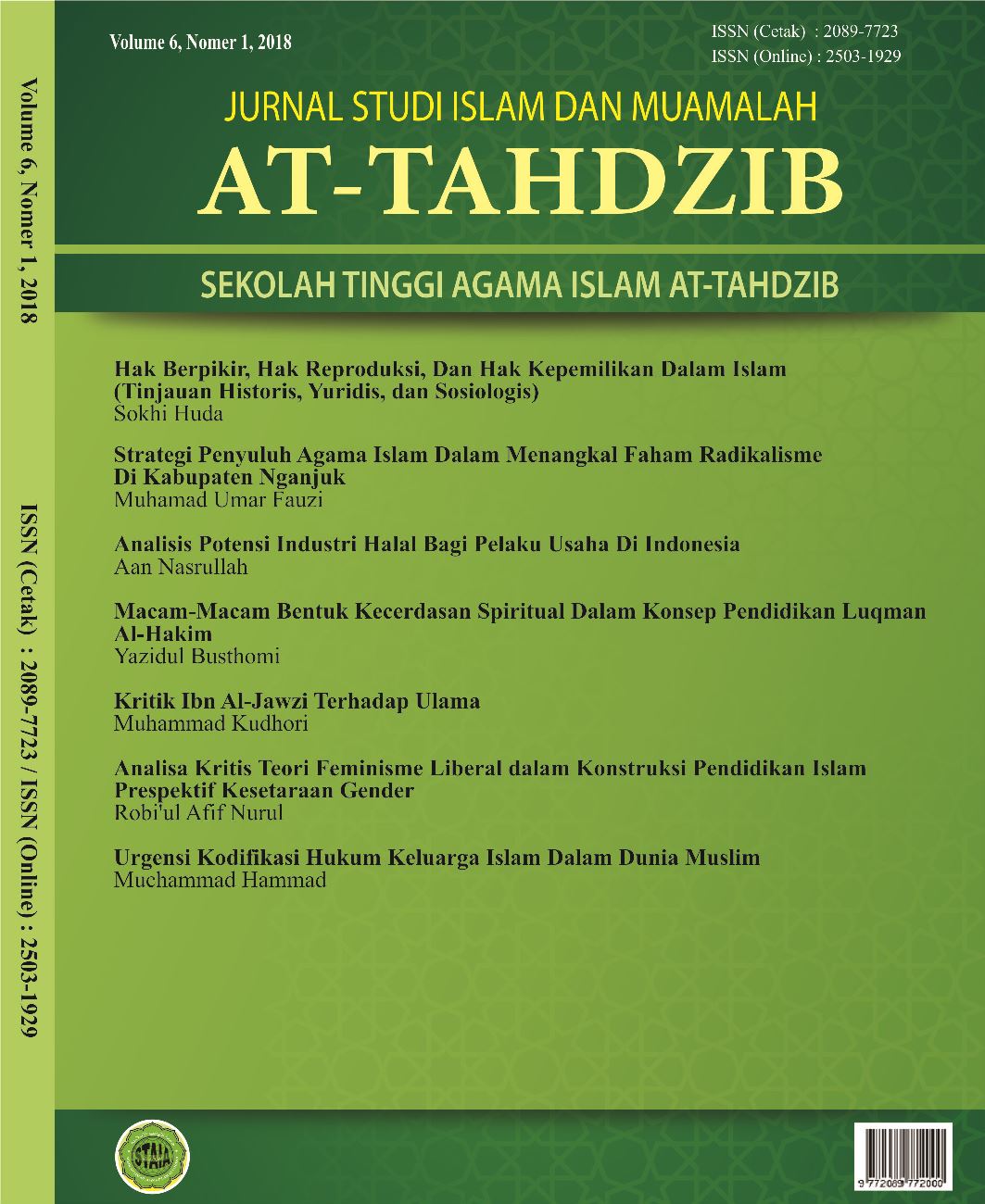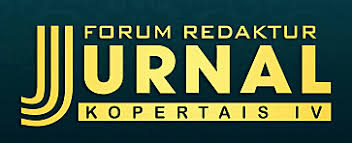Strategi Penyuluh Agama Islam Dalam Menangkal Faham Radikalisme di Kabupaten Nganjuk
Abstract
Extension of Islam is one component of officials who are owned by the Ministry of Religious Affairs in terms of preaching to all levels of society in Nganjuk. Nganjuk district was once thrown by the event of suspected terrorist arrest in Kertosono sub-district. This suggests that a seemingly calm situation in a region can not guarantee that the area is free from radical nests. Therefore, extension agents as the spearhead of the Ministry of Religious Affairs that directly interact with the community at all levels, the role and strategy of extension of Islam is very reliable to prevent the development of radical ideology in Nganjuk district. The approach in this research is deductive and inductive. The type of research used is qualitative research. Researcher is an instrument or tool of research and collect data using observation method, interview, and documentation. The data analysis used is interactive model analysis consisting of; (1). Data reduction (selection of data by theme); (2). Display data (data presentation); and (3). Conclusion / verification. And by examination technique using Trianggulasi. From the research results can be obtained the conclusion that: Extension of Islamic Religion of Nganjuk district amounted to 8 civil servant and 160 Counselor Non-civil servant. There are eight types of specialization of the capability of the established Islamic Counselor. To prevent the development of radical ideology in Nganjuk district, the strategy used is: Placing one counselor of Islam who has competence in the field of Radicalism in every sub-district, Hearings with the authorities to become partners in counseling, Seeking then told to the public about the characteristics and the danger of radical groups,, Strengthening aqidah understanding Ahlusunnah wal Jamaah and instilling love soul of the country, Encouraging people to be active in religious activities held by moderate Islamic organizations.
References
Appleby, R. Scott.2000. The Ambivalence of the Sacred: Religion, Violence, and Reconciliation. Rowman & Littlefield.
Asep Saeful Muhtadi.2003.Metode Penelitian Dakwah. Bandung. Pustaka Setia
Beaudreau, Bernard C. 2012. A Humanistic Theory of Economic Behavior. The Journal of Socio-Economics, Vol. 41
Census Of 1930. In the Netherlands Indies. Vol viii. Jakarta: Landsdrukkerij
Creswell, John W. 1994. Research Design: Qualitative and Quantitative Approaches. California: Sage Publications, Inc
Deliar Noer. 1985. Gerakan Modern Islam di Indonesia 1900-1942. Jakarta. LP3ES, Anggota IKAPI
Depag RI Balitbang dan Diklat Pusdiklat Tenaga Teknis Keagamaan Dakwah bil lisan, bil hal dan dakwah bil qolam, , Jakarta,2007
Departemen Agama Republik Indonesia. 2005. Al-Qur’an dan Terjemahannya. Bandung. JUMANATUL ALI-ART
Djawahir Tanthowi DKK. 2011.Buku Penunjang Tugas Penyuluh Agama (Manajemen Dakwah). Jakarta. Kementerian Agama Islam.
Djohan Effendi,1994 “Konsep-konsep Teologi†dalam Budhy Munawar Rachman (Ed). Kontekstualisasi Doktrin Islam dalam Sejarah Jakarta:Paramadina
Esposito, John L.2010. The Future Of Islam. New York:Oxford University Press.
Hasyim Afandi.2016. Menghadang Radikalisme di Bumi Nusantara.Nganjuk.STAIM PRESS
Henri Shalahuddin, “Shi’ah, Sebuah Gerakan Takfiri†dalam Hamidi Fahmy Zarkasyi et.al (ED), teologi ajaran Syi’ah menurut Referensi Induknya (Jakarta:INSIS,2014), 270.
https://m.tempo.co/read/news/2016/01/15/078736374/bom-thamrin-serangan-ala-paris-di-Jakarta-ini-buktinya, diakses pada 10 juli 2016
Ilyasin Mukhamad dan Zamroni. 2017.Penyebaran Radikalisme dan Terorisme di Kalimantan Timur. Samarinda. IAIN Samarinda PRESS
Imarah, Muhammad.1999. Islam dan Pluralitas. Depok. Gema Insani. Hal:261
Inbar, Efraim, Maddy-Weitzman, Bruce.2013. Religious Radicalism in the Greater Middle East. Oxon:Routledge.
Kemenag.2011. Laporan Akhir Tahun Kementerian Agama Tahun 2011. Jakarta: Badan Litbang dan Diklat Kementerian Agama
Khisbiyah, Yayah.2000. Melawan Kekerasan tanpa Kekerasan. Pimpinan Pusat Ikatan Remaja Muhammadiyah. Yogyakarta: The Asia Foundation bekerjasama dengan Pustaka Pelajar
Lexy J. Moleong.2000. Metodologi Penelitian Kualitatif, Bandung: Remaja Rosdakarya
Miles dan Huberman.1992. Qualitatif Data Analysis. Tjetjep Rohendi Rohidi (penerjemah). Analisi Data Kualitatif. Jakarta: UI Press
Misrawi, Zuhairi, 2010. Pandangan Muslim Moderat: Toleransi, Terorisme, dan Oase Perdamaian. Jakarta: Penerbit Buku Kompas.
M. Natsir, Islam sebagai Ideologi, Edisi ke 2 (Jakarta: Penyiaran Ilmu, 1951).
Nasution, M. Yunan, Islam dan Problema-problema Kemasyarakatan, Jakarta: Bulan Bintang, 1998.
Natsir, M, Fiqhud Da’wah, Jakarta: Dewan Dakwah Islamiyah Indonesia, 1977
Qodir, Zuly 2004, Syari’ah Demokratik: Pemberlakuan Syari’ah Islam di Indonesia. Yogyakarta: Pustaka Pelajar
S. Nasution, Metode Penelitian Naturalistik Kualitatif (Bandung: Tarsito, 2003)
Tanthowi Djawahir.2011.Buku Penunjang Tugas Penyuluh Agama (Manajemen Dakwah). Jakarta. Kementerian Agama Islam Republik Indonesia.
The Reconstruction Of Religious thought in Islam (Lahore: Syaikh Muhammad Ashraf, 1951)
Copyright (c) 2018 At-Tahdzib: Jurnal Studi Islam dan Muamalah

This work is licensed under a Creative Commons Attribution 4.0 International License.

Jurnal Studi Islam by At-Tahdzib is licensed under a Creative Commons Attribution 4.0 International License.
Based on a work at http://ejournal.kopertais4.or.id/mataraman/index.php/tahdzib





